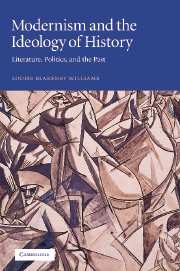Book contents
- Frontmatter
- Contents
- Acknowledgements
- Abbreviations
- Introduction
- 1 “Immaterial pleasure houses”: the initial aesthetic dilemma
- 2 “A more dream-heavy hour”: medievalist and progressive beginnings
- 3 “Pedantry and hysteria”: contemporary political problems
- 4 “A certain discipline”: radical conservative solutions
- 5 “A particularly lively wheel”: cyclic views emerge
- 6 “Our own image”: the example of Asian and non-Western cultures
- 7 In “the grip of the … vortex”: the proof of Post-Impressionist art
- 8 The “cycle dance”: cyclic history arrives
- 9 “The Nightmare” and beyond: the First World War and mature cyclic theories
- Conclusion
- Notes
- Index
2 - “A more dream-heavy hour”: medievalist and progressive beginnings
Published online by Cambridge University Press: 22 September 2009
- Frontmatter
- Contents
- Acknowledgements
- Abbreviations
- Introduction
- 1 “Immaterial pleasure houses”: the initial aesthetic dilemma
- 2 “A more dream-heavy hour”: medievalist and progressive beginnings
- 3 “Pedantry and hysteria”: contemporary political problems
- 4 “A certain discipline”: radical conservative solutions
- 5 “A particularly lively wheel”: cyclic views emerge
- 6 “Our own image”: the example of Asian and non-Western cultures
- 7 In “the grip of the … vortex”: the proof of Post-Impressionist art
- 8 The “cycle dance”: cyclic history arrives
- 9 “The Nightmare” and beyond: the First World War and mature cyclic theories
- Conclusion
- Notes
- Index
Summary
the loveliness
That has long faded from the world;
The jewelled crowns that kings have hurled
In shadowy pools, when armies fled;
The love-tales wrought with silken thread
By dreaming ladies upon cloth
That has made fat the murderous moth;
The roses that of old time were
Woven by ladies in their hair,
The dew-cold lilies ladies bore
Through many a sacred corridor
Where such grey clouds of incense rose
That only God's eyes did not close:
For that pale breast and lingering hand
Come from a more dream-heavy land,
A more dream-heavy hour than this.
W.B. Yeats, “He Remembers Forgotten Beauty,” from The Wind Among the Reeds, 1899In 1902 there was one particular dream-world that William Butler Yeats regretted he could never see. “That indolent, demonstrative Merry England” when “men still wept when they were moved, still dressed themselves in joyous colours, and spoke with many gestures” was gone for ever. Two years earlier Ford Madox Ford also expressed a desire to be “back in a century – some beatific century that one cannot name – when nothing was hurried, nothing was passion-worn, nothing strove; when everyone was at peace with his neighbors, when the greatest of crimes was that of sitting up late o'nights.” An older way of life, be it joyous and colorful, or slow and peaceful appealed to all five Modernists early in their careers.
- Type
- Chapter
- Information
- Modernism and the Ideology of HistoryLiterature, Politics, and the Past, pp. 39 - 54Publisher: Cambridge University PressPrint publication year: 2002



